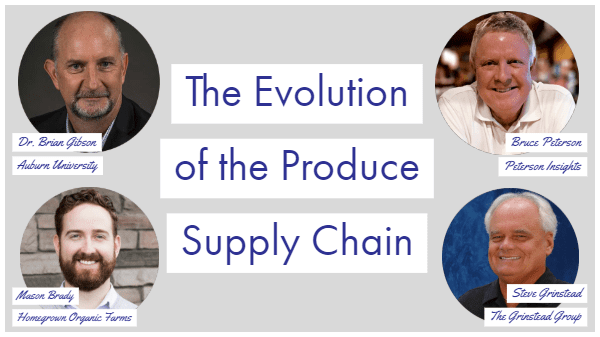PRESENT DAY ISSUES
While produce companies have made great strides in fulfillment consistency, customer satisfaction, and supply chain safety, supply chain perfection is a never-ending quest. The dynamic nature of the industry means that operational consistency is today’s concern.
Our roundtable discussion participants are Mason Brady, director of finance and supply chain at Homegrown Organic Farms in Porterville, CA, which grows and markets certified organic blueberries, citrus, stone fruit, and grapes; Steve Grinstead, CEO of the Grinstead Group in Dallas, TX, which provides professional services to the food industry; and Bruce Peterson, president and founder of Peterson Insights in Bentonville, AR, which specializes in food merchandising and procurement consulting services.
What are the current headaches in the produce supply chain?
Brady: In my opinion, there’s so much subjectivity to the Food Safety Modernization Act (FSMA). The federal and state representatives that come out to audit don’t quite know specifically what they’re looking for. And the rules have an exemption for farms producing less than $25,000 in standing revenue. In the organic space, that’s a very signification portion of the volume.
Peterson: Very well said. The fundamental challenge with the whole thing is who’s exempt? When we overtly exempt local or small suppliers, it undermines the entire reason for FSMA. Generally speaking, exposure exists at the lowest level, not with the large players.
How can companies deal with this issue?
Grinstead: The bigger companies have done it right for a long time. There’s some additional recordkeeping and data that comes into play. It gets much more complicated for smaller companies because they’re having to do different things, change their processes, and deal with the increase of information gathering and data storage.
Brady: We’re trying to adopt an internal auditing program, but we have no idea if federal auditors will say whether it suffices or not. It’s an everybody-for-themselves mindset. Going above and beyond what your third-party audit would do, showing that to a federal auditor, and hoping it suffices is the industry approach right now.
What about labor?
Grinstead: Labor has always been a challenge and there are many pressures across the industry. Immigration policy has the greatest effect on the growing side of business. On the distributor side, it’s the low unemployment rate and the type of job. Picking product in a cold, wet cooler on third shift is not an ideal job when other options exist. And then, we have a severe driver shortage. Kids don’t aspire to be truck drivers.
Peterson: People are having fewer children and we have a shrinking population of people coming into the job market. When you couple this with Steve’s points, it makes a tough problem worse. Nobody wants to pick strawberries or work in a wet cooler all night if they can work for Amazon instead.
Brady: Having enough people comes down to the incentive systems you have and goes beyond pay—provide a place where they enjoy working.
Where is the industry on traceability?
Peterson: Traceability is so extraordinarily important, but how do you embrace standardization? If you’re a company of any size, you have some mechanism for supply chain traceability.
The problem was that every retailer’s methods were different. Everybody has to agree on a single direction. You’ll never have effective traceability if you can’t implement a system that’s cost effective and affordable for small and seasonal growers. Without this, your risk exposure remains the same.
Brady: Everyone wants to ensure that if there’s an issue it can be resolved quickly, but things like the Produce Traceability Initiative (PTI) come and go. It’s hard to take the PTI initiative seriously when only Kroger and Walmart are specifically asking for the information and PTI-labeled product. The idea of traceability won’t disappear, but we need to find solutions to address the challenge differently.



